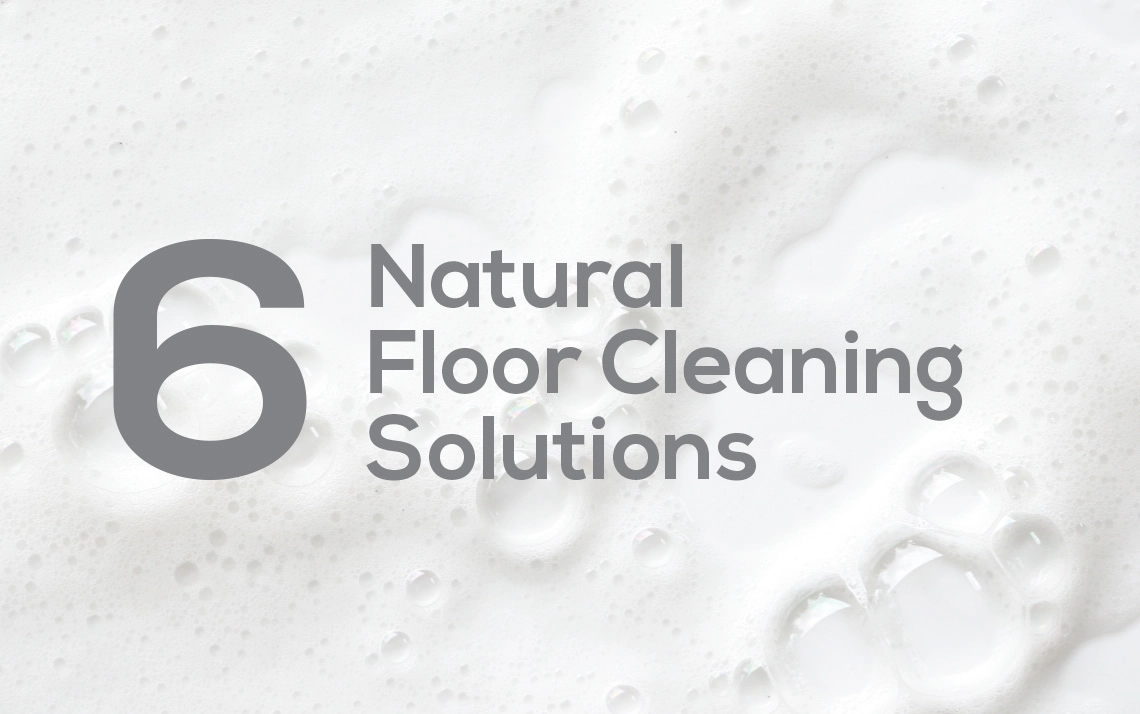
One of the greatest appeals of hard flooring is how easy it is to clean. Floors made of materials like tile, wood, and concrete make you feel like you can just wipe and go. Sometimes, though, you may encounter more stubborn spots or delicate materials that merit a little extra attention.
Before you get started, make sure you know what your floor is made of and research what you can and can't clean it with. Don't use abrasive brushes on soft materials like cork, too much water on wood floors or too much vinegar on sensitive materials like marble and granite. You'll also want to do a spot test somewhere inconspicuous to make sure your new cleaner doesn't damage or discolour the floor.
We also encourage you to sweep or vacuum (if compatible with your flooring) before using a liquid cleaner to make sure any solid debris is picked up and well out of the way rather than left to disintegrate into a pile of soggy mush. We recommend mopping floors in high-traffic areas like your kitchen once a week, while those with less activity (or less grime potential) can get a swab every other week or once a month depending on the neatness of your household.
We scanned through some of our favourite sites to find these tips for cleaning your floors naturally.
Just a few simple household ingredients are all it takes to clean your floors naturally. Here are some of the most effective DIY options.
The classic household hero, white vinegar, strikes again. One common ratio is half a cup of white vinegar per gallon of water, though other sources recommend equal parts of each - the decision will hinge on how your specific floor material handles the acid in vinegar. Just dump the two in a bucket, adding a few drops of a colourless essential oil for scent if you so choose, then happily mop away.
If you're working with a wood floor, try adding half a cup of white vinegar and one teaspoon of vegetable oil to a cup of water. Mix the components together and rub them on the floor with a cleaning rag, either covering the whole surface or just going for the occasional spot. You'll want to go over it again with a different, clean rag to avoid leaving any household-sabotaging slippery spots. You can also create the mixture in a spray bottle for more specific spot-cleaning potential.
Its individual ingredients' properties allow it to work on a variety of flooring materials. Rubbing alcohol, for example, helps speed up evaporation time to avoid floor streaks and also helps both disinfect and degrease the floors, while dish soap will dissolve the bond between the dirt and floor while it degreases and cleans. You specifically want a simple, straightforward dish soap for this mixture; avoid additions like moisturisers or antibacterial ingredients. Their ratio of two cups of warm water, half a cup of vinegar, a quarter cup of isopropyl alcohol and just an eighth teaspoon of liquid dish soap also cuts the acidity of the vinegar so that it won't damage sensitive floors.
Washing soda is also a popular additive to floor solutions. Though it's primarily used for laundry (as you may have guessed from the name), its grease- and stain-fighting abilities mean it's easily adapted for general floor use. A mixture of 4.5L of hot water, two tablespoons of white vinegar, two tablespoons of washing soda and one and a half teaspoons of liquid dish soap (see our notes on liquid dish soap above). Make sure the water is hot since high temperatures are necessary for the washing soda to properly dissolve. This one is best mixed in a bucket and used for mopping.
Another wood floor tip: Adding olive oil to a wood-floor-cleaning mix helps shine up your floors even after the mixture dries. Add three-quarters of a cup of olive oil and half a cup of lemon juice to a gallon of hot water, mix them together and apply to the floors with a well-wrung-out mop.
We return once more to the land of science fair volcanoes, but this time on your tile floor. While you can use a baking soda and vinegar combo as a general floor cleaner, they may be even more useful as a grout cleaner for your pesky tile-line grime. You don't need to do this regularly, but it's an excellent refresher every few months. Combine equal parts baking soda and warm water to form a thick paste. Spread this paste on your grout, then take a spray bottle of vinegar and spray it over the paste-covered areas. Let the vinegar sit for about 15 minutes to get all the benefits of that fun fizzing reaction, then use a brush (an old toothbrush will suffice) to scrub. Rinse with warm water once you're finished.